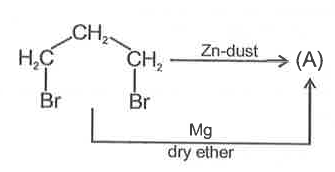Define neutralization reaction with an example.
Step-by-Step Text Solution:
1. Definition of Neutralization Reaction:
A neutralization reaction is a chemical reaction that occurs when an acid reacts with a base. The result of this reaction is the formation of a salt and water.
2. Components of the Reaction:
- Acid: A substance that donates protons (H⁺ ions) in a reaction.
- Base: A substance that accepts protons (OH⁻ ions) in a reaction.
3. General Equation:
The general form of a neutralization reaction can be represented as:
Acid+Base→Salt+Water
4. Example of a Neutralization Reaction:
Let's consider hydrochloric acid (HCl) as the acid and sodium hydroxide (NaOH) as the base.
- When HCl reacts with NaOH, the reaction can be written as:
HCl+NaOH→NaCl+H2O
- Here, sodium chloride (NaCl) is the salt formed, and water (H₂O) is also produced.
5. Conclusion:
Therefore, a neutralization reaction is characterized by the interaction between an acid and a base, resulting in the formation of a salt and water, exemplified by the reaction between hydrochloric acid and sodium hydroxide.
---
A neutralization reaction is a chemical reaction that occurs when an acid reacts with a base. The result of this reaction is the formation of a salt and water.
- Acid: A substance that donates protons (H⁺ ions) in a reaction.
- Base: A substance that accepts protons (OH⁻ ions) in a reaction.
The general form of a neutralization reaction can be represented as:
Acid+Base→Salt+Water
Let's consider hydrochloric acid (HCl) as the acid and sodium hydroxide (NaOH) as the base.
- When HCl reacts with NaOH, the reaction can be written as:
HCl+NaOH→NaCl+H2O
- Here, sodium chloride (NaCl) is the salt formed, and water (H₂O) is also produced.
Therefore, a neutralization reaction is characterized by the interaction between an acid and a base, resulting in the formation of a salt and water, exemplified by the reaction between hydrochloric acid and sodium hydroxide.
Topper's Solved these Questions
- CHEMICAL CHANGES AND REACTIONSBOOK - ICSECHAPTER - CHEMICAL CHANGES AND REACTIONSEXERCISE - EXERCISE 2(C)
30 Videos
- CHEMICAL CHANGES AND REACTIONSBOOK - ICSECHAPTER - CHEMICAL CHANGES AND REACTIONSEXERCISE - EXERCISE 2(C)
30 Videos
- ATOMIC STRUCTURE AND CHEMICAL BONDINGBOOK - ICSECHAPTER - ATOMIC STRUCTURE AND CHEMICAL BONDINGEXERCISE - EXERCISE 4(D)
21 Videos
- ICSE EXAMINATION PAPER 2020 BOOK - ICSECHAPTER - ICSE EXAMINATION PAPER 2020 EXERCISE - Section-I
11 Videos
Similar Questions
Knowledge Check
This reaction is an example of :
 Asubstitution reactionBaddition reactionCcondensation reactionDelimination reaction
Asubstitution reactionBaddition reactionCcondensation reactionDelimination reaction
(a) List in tabular form two differences between an acid and a base based on their chemical properties.
(b) What do you understand by neutralization reaction ? Give two examples to illustrate your answer with equations.
View SolutionThe reaction,

is an example of ,
View SolutionDefine reparative regeneration with examples.
View SolutionDifferentiate between the following: Neutralization reaction & a precipitation reaction.
View SolutionDefine enthalpy of reaction.
View SolutionThe following reaction is an example of <

View SolutionGive examples of following reactions Neutralization reaction (ii) Double decomposition
View Solution
